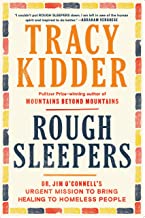Rough Sleepers: Dr. Jim O’Connell’s Urgent Mission to Bring Healing to Homeless People by Tracy Kidder 2023
Kidder has written an important book which might have been inspiring if it wasn’t so damn depressing. As he has often done in the past, he has identified an individual who by their actions and impact serves as the focal point for a detailed presentation of a topic, in this case homelessness.
In prose that is both informative and readable, Kidder introduces us to Jim O’Connell. Brought up in a working class Irish household in Rhode Island by a hard-working father and a mother whose depression resulted in long absences from the family, he attended Notre Dame and Cambridge where he studied philosophy and then embarked on a decade of exploration and travel before landing at Harvard Medical School in his 30’s. After an internal medicine residency in which he clearly excelled, he was headed to an oncology fellowship at the prestigious Memorial Sloan Kettering when his lifework intervened. Asked by his Chief of Medicine to be the physician at the Pine Street Inn where homeless people were cared for and housed, O’Connell agreed to a one year interruption in his high-powered training. That year evolved into a lifetime career of providing medical care and support for Boston’s unhoused population.
Kidder, like the two other great non-fiction writers of our time, John McPhee and Robert Caro, spends years living the book that he is writing. In this case, he prevailed upon O’Connell, a man who typically shuns publicity, to shadow him in his daily activities. Together they rode the van which several nights a week travels through nighttime Boston providing soup, blankets, socks, and care to the most hard-core street people. Together they manned the Thursday Street Clinic at MGH seeing men and women in need of medical care. Together they visited Mousey Park where street people congregated daily and where they could check on the status of long term users of their services. Kidder became familiar not only with O’Connell but with the nurses at Pine Street and then at a former morgue turned into a respite care center with over 100 beds for the city’s homeless in need of in-patient care, with O’Connell’s Street Clinic team of mental health and street workers, and most importantly with a number of the city’s homeless. Kidder became deeply involved with a number of them, most of all with Tony Rinaldi who he accompanied to court, visited in the hospital, and often saw on the streets.
By focusing more than half of the book on Rinaldi and his medical, social, and legal challenges and their origins, Kidder avoids writing what could easily have been solely a hagiographic treatment of O’Connell and broadens the book’s focus to the crisis in housing—housing as a basic human right, housing as the foundation for enabling people challenged by poverty, chronic illness, addiction to alcohol and/or drugs, and mental illness to begin to find the means to create a life among the chaos of their situation on the streets.
The book ultimately fails to land in an optimistic place. Many of the street people whom we have met have died during the course of the story. (The rate of death among the homeless is almost 10 fold greater than similar aged housed individuals in Boston.) O’Connell, now in his 70’s, has a chronic illness and is slowly handing over the now multi-million dollar, grant and Medicaid supported program to others. Boston’s homeless population has continued to grow as rents climb and gentrification spreads, and Boston’s problem is dwarfed by the challenges facing LA, Seattle, and other west coast cities. Mental health and addiction services remain insufficient. And on and on—one more of our inequitable society’s failures to care for its most needy.
I’m predicting that Kidder’s book will garner a basketful of literary awards. A Pulitzer would bring his writing career full circle since his first book, ‘The Soul of a New Machine’, about Data General and the new computer revolution, won the Pulitzer in 1982. It’s also likely and sadly that this book will have little or no impact on how we deal with those who sleep on steam grates and in doorways in every major city in America. Medical treatment of pneumonia, wounds infested with maggots, and trauma from fights and assaults will not solve the problem on a scale that is necessary. O’Connell, drawing upon his philosophy background, likens his work to the myth of Sisyphus who pushes a boulder up a hill only to have it roll back down, day after day after day. What separates O’Connell from others, is that he can cite Camus who noted that in the face of life’s absurdity, ‘one must imagine Sisyphus happy.” O’Connell notes that just as Sisyphus pushes the rock up the hill, his own efforts with the homeless are ‘what we do while waiting for the world to change.”
A book well worth reading.



